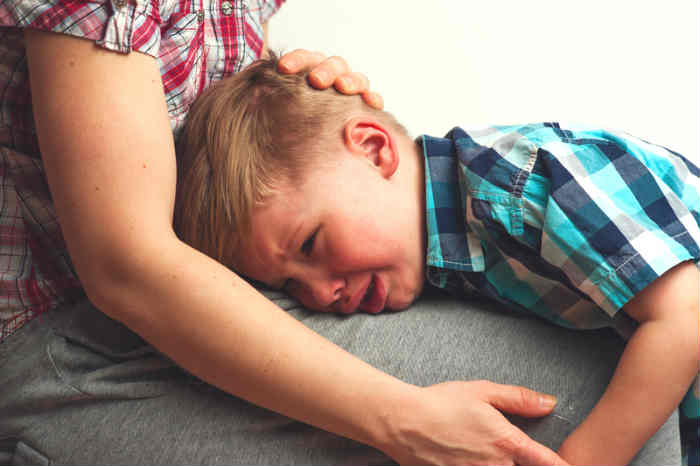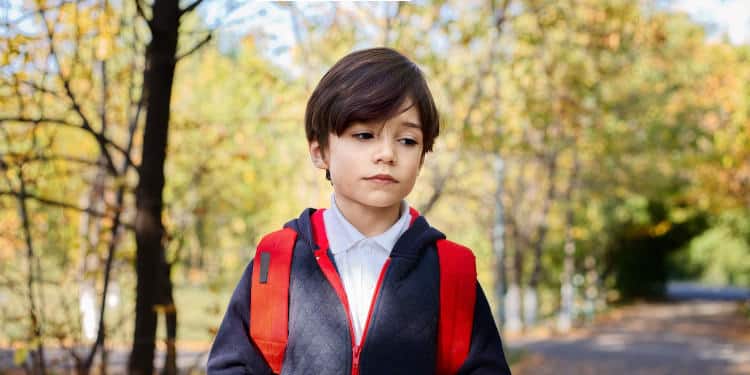










For most kids, returning to school after a long break such as summer vacation can include a broad mix of emotions. Excitement and trepidation about what lies ahead are very common. However, for children who struggle with academics or social situations, going back to school can be a time they dread, filled with stress and anxiety.

If your children are feeling nervous about the return to school, they are not alone. Here are some tips for helping children to cope with back-to-school anxiety.
It can help to first understand that there’s always some anxiety that comes with an unknown situation. Feeling nervous means that something you cannot control is important to you. Accepting that some level of anxiety is normal is a great start.
How this works in the real world may look quite different depending on your child’s age. For younger children, you may simply validate that a lot is going on and that it’s okay to feel whatever they’re feeling. Help them practice ways to express themselves and cope with strong emotions.
For older children and teens, you might let them know that you get anxious too, and it’s a perfectly normal way to feel. Share the last time you experienced something that you were uncertain about, and how it turned out.
Next, help yourself and your kids take control of the things you can influence. In an ordinary situation, things we can control might be preparing school supplies, learning about the updated schedule or new building, or reviewing the materials to be covered in the upcoming months.
If there are some subjects where your child expects to encounter difficulty, set them up with tutors, online courses, or supplemental learning materials that can help them keep up with the class.
You should also consider preparing the logistical aspects of going back to school. This can include traveling to school (before it starts), purchasing all the supplies in advance, and preparing their backpack with them. Anything you can do to add familiarity to the first day can reduce anxiety.
Once you have taken care of everything that is within your power to plan, then comes the hard part; accepting there will be many unknowns. Coping with unknown and uncontrollable situations is a valuable life skill that children will need to learn.
Ask your child what their worst nightmare about school would be, and face the fear, talking about it out loud. Often, it’s either not as bad as they think, or at least they will realize there’s nothing to be done about it. Sometimes, you may come up with a solution together that they hadn’t yet considered. Bringing these worries into the light, rather than keeping them inside can help alleviate stress.
Kids worry about school for different reasons. Often older children who struggle socially are afraid to tell their parents how bad it is. They either worry that they’ll be seen as a disappointment or are ashamed to admit they have issues with peers. Often kids, particularly in middle school and early high school, face societal pressure when it comes to appearance, dating, or social media status.
Children who are more focused on academics than on popularity can struggle just as much. Their pressures may be to achieve high grades and remain at the top of the class. In the past, success may not have been challenging to attain, but can now suddenly feel uncertain and overwhelming.
It’s important to realize that children and teens face many of the same stresses adults have, and then some. However, they have less life experience to know how to deal with them. They often think they’re alone or that no one can understand what they’re going through.
Talking about these issues can be helpful, so keep the lines of communication open. If your child or teen is not one to open up easily to adults, which is somewhat normal for older kids, try a different approach. Rather than pressuring them for information, tell them about some of your own experiences in school. Share personal stories, even embarrassing ones, and the areas you struggled with. Don’t state that you know what they’re going through; rather share your stories as you would with a friend. Even if your child thinks that you don’t understand them, at least they’ll know that you’re trying to empathize with their experience, which can provide comfort.
If your child is feeling highly anxious and overwhelmed about returning to school, consider making a coping plan. This might be a formal or informal guide that can remind kids to use self-calming techniques in times of stress. It might include a list of things they already like to do, such as drawing, listening to music, or playing games. Or it might include a new set of skills, such as taking deep breaths, meditating, or journaling. This could also take the form of a stress kit, such as a box or bag your child can keep in a bookbag, with ideas and tools to use when they’re feeling stressed.
Often adults neglect to explain what they perceive to be the basics to kids. Older children might ask questions, but younger kids don’t always know how or what to ask. Walk them through how school will go, what will happen, and how some things may change as the weeks and months progress. Having some context for what’s going on can make things easier.
It’s surprising how often little things, such as getting the right kind of breakfast, can make a big difference. Make sure your child is getting healthy food, sleep, exercise, and breaks from screens. These basic areas of self-care can make emotions easier to regulate and can help decrease anxiety.
Returning to school can be an exciting time for many children. It can also bring much anxiety or worry for both kids and adults. Like with any new situation, a balance of preparation and acceptance can make things a little bit easier.
Sources